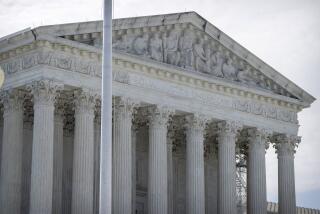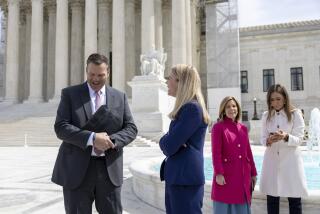Court Lifts Kennedy Order, OKs Abortion
WASHINGTON — The Supreme Court said Thursday that a 15-year-old Florida girl may go ahead with plans to end her pregnancy as it lifted an order imposed two days ago by Justice Anthony M. Kennedy that had blocked her abortion.
The decision not to intervene in the case ended a brief but curious episode, one that raised intriguing questions about Kennedy, the newest justice on the court.
The episode was unusual because the case--involving a teen-ager identified only as T. W. and a Florida law regulating abortions for minors--is still pending in the state court. The Supreme Court normally does not involve itself in such matters until after final disposition by lower courts.
Reagan Appointee
Kennedy, a conservative 1988 appointee of former President Ronald Reagan, has yet to take a public stand on the abortion issue. But he is being watched closely for clues to his leanings on the issue because the court is weighing a Missouri case in which the justices are being asked to revise or overrule the 1973 Roe vs. Wade decision that made abortion legal.
Did Kennedy’s order blocking the teen-ager’s abortion mean that he is a staunch foe of abortion? Or was it simply the action of a cautious and possibly inexperienced justice?
Those questions were being asked Thursday by lawyers and activists in the abortion struggle. Most said, at least when speaking to the media, that the incident provides no solid evidence of Kennedy’s basic views. But some said that his move gives the strongest indication yet that he will join the court’s firm anti-abortion bloc, which includes Chief Justice William H. Rehnquist and Justices Byron R. White and Antonin Scalia.
Eve Paul, general counsel for the Planned Parenthood Federation, sharply criticized Kennedy’s action but said that she was pleased by Thursday’s action by the full court.
“There was no justification whatsoever for Justice Kennedy granting that stay. It was completely inappropriate and only delayed the normal process. But, other than that, I don’t want to read any more into it,” Paul said.
The court’s action Thursday leaves Florida without any law curbing teen-age abortions.
James Bopp Jr., general counsel for the anti-abortion National Right to Life Committee, said that Kennedy’s move was a “positive development” because he had recognized the need to move quickly to save the unborn child. “But I don’t think this really tells us much about Roe or about his position in Webster,” said Bopp, referring to the pending Missouri abortion case.
No Legal Rights
Under the Roe doctrine, a woman has a constitutional right to get an abortion during the early months of a pregnancy. The fetus is accorded no legal rights until it reaches the point of viability, usually after 24 weeks into a pregnancy. In succeeding rulings, the court has said that states may put stricter limits on abortions for minors.
The Florida case arose over a 1988 state law giving a pregnant teen-ager the option of getting permission for an abortion from her parents or a judge. On May 2, the girl, who was about 11 weeks pregnant, asked a Lake County judge for permission to get an abortion, saying that she feared “abuse” by her parents if she turned to them.
Rather than rule on her request, the judge struck down the law as “unconstitutionally vague” but said that T. W. could not get the abortion until the issue was appealed.
Last Friday, a state appellate court also ruled the law unconstitutional. Responding quickly, the Florida Supreme Court announced that it would hear the issue but not until its fall term in September. In the interim, it said, girls such as T. W. may go ahead with planned abortions.
The trial court judge also appointed a lawyer, Richard Boylston, to represent the fetus. Boylston sent an emergency appeal to Kennedy, who is charged with reviewing such requests from the Southeast region.
Each justice routinely receives dozens of emergency appeals yearly. They are rarely granted. However, if a justice concludes that an emergency appeal raises a profound issue that the entire court should hear and if “irreparable harm” may be done in the interim, the justice may on his own authority grant a stay to block further action.
More to Read
Sign up for Essential California
The most important California stories and recommendations in your inbox every morning.
You may occasionally receive promotional content from the Los Angeles Times.











